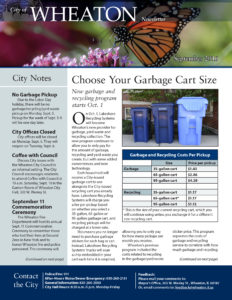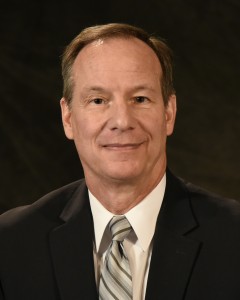Wheaton, Illinois
Since 2007 upwards of 14,000 households in Wheaton paid for their curbside collection of solid waste and recycling by purchasing “stickers” and attaching them to containers of garbage and yard waste. While stickers were not required for recycling, the cost of collecting and processing recyclables was built into the total sticker price. The lack of clear pricing for recycling led to a general perception that the activity was somewhat profitable for waste haulers and an even greater misconception that recycling collection and processing was a “free” service. While this original pricing structure was successful in encouraging recycling, it was also noted by the waste contractors to lead to greater levels of recycling contamination. Approximately 20% of items placed in recycling containers were considered non-recyclable.
Trends in the waste hauling industry indicated the declining market value of recycled materials that would necessitate increased costs for the collection and processing of these materials. Under the original model, this would translate to increased fees for stickers and perpetuate the misconception that reselling recyclable materials is a profitable enough activity to collect them at no cost.

With the City’s existing waste hauling contract set to expire in 2016, it was clear to staff that a successful program might require the separation of fees for garbage and recycling pickup. Staff, led by then-Assistant City Manager Mike Dzugan, conducted a community survey to assess what factors or features are most important to residents on this issue. Questions focused on existing perceptions and those changes that might be warranted by a new program. Survey items included: the possibility of fees for recycling collection, standardized carts, automatic billing, alternate pricing structures, and additional program features such as organics/food scraps recycling. A total of 2,170 residents responded to the survey. A summary of some key findings:
- While satisfaction with service provision was high for both garbage and recycling collection, there were significantly lower levels of satisfaction with the use of stickers for payment.
- Most respondents agreed with the use of volume-based pricing, or pay-as-you-throw (PAYT), for garbage but not for recycling.
- Most residents disapproved of flat monthly fees for service.
- Many residents indicated support for “free” recycling through the survey’s open comments section. While residents may not fully understand that the price to collect recycling is embedded in the cost of garbage stickers, the survey indicates that many approve of financial incentives to promote recycling.
Information from the survey played an important role in the solicitation of bids for the program and the city’s transition strategy. After several months of research, the contract to collect solid waste in Wheaton was awarded to Lakeshore Recycling Systems (LRS) in August 2016. LRS’ proposal relied far less on stickers, offered multiple payment options to residents, and maintained the community’s preferred pricing structure, PAYT. However, the new program would include separate fees for garbage and recycling pickup. The decision to part from the combined-fee model considered the community’s strong preference toward equitable volume-based pricing, industry trends regarding the sustainability of no-cost recycling pricing structures, and the city’s prior experience with recycling contamination.
 Findings from the survey also indicated the community would, to some degree, be dissatisfied with the implementation of recycling fees. In the months leading up to the new program city staff and LRS crafted a multi-pronged outreach strategy to inform and educate residents about the benefits of this new approach. Through websites, email, utility bills, postcards, informational seminars and videos, every opportunity was taken to clarify how recycling costs had been accounted for in the past and how separating these fees may actually reduce total household costs under the new program.
Findings from the survey also indicated the community would, to some degree, be dissatisfied with the implementation of recycling fees. In the months leading up to the new program city staff and LRS crafted a multi-pronged outreach strategy to inform and educate residents about the benefits of this new approach. Through websites, email, utility bills, postcards, informational seminars and videos, every opportunity was taken to clarify how recycling costs had been accounted for in the past and how separating these fees may actually reduce total household costs under the new program.
The new program went into effect in October 2016 and thus far LRS’ monthly reports indicate no significant difference in the total amount of recyclables collected from residents.[1] While it was a community concern that the implementation of a recycling fee would inhibit total recycling, no such effect is apparent. Additionally, LRS has expressed no concerns with potential recycling contamination. One of the biggest changes to the program is the use of new waste bins containing an RFID chip rather than the use of stickers. The RFID chip is scanned by the waste hauler at time of pick up and charges residents based on the volume of waste or recycling collected. In addition to the new technology, LRS is also offering a food scraps collection service whereby residents may place organic waste with yard waste. Stickers will still be used on a limited basis for bulk items and yard waste.
While many cities continue to offer or promote a form of “free” or subsidized recycling as part of their general waste removal services, as the cost to process recycling continues to exceed the resale value of collected materials, these policies may soon not be realistic for all communities. In Wheaton, the city focused its attention on the community’s preference for equitable, volume-based pricing. While it was not realistic to maintain no-cost recycling, the city addressed this issue by providing information to residents that would facilitate a more objective comparison between the two programs.
[1] Monthly reporting data from Advanced Disposal and LRS. Comparing the tons of recycled material between January and July of 2016 and January and July of 2017. Analysis indicates <1% increase from 2016-2017.
Meet the Manager

